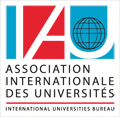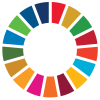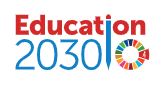Examples of good practice for SDGs at KIIT-KISS, India
Kalinga Institute of Industrial Technology
Examples of good practice for SDGs at KIIT-KISS, India
Sustainable Development Goals
Current Initiatives from KIIT-KISS for the SDGs
The global agenda for sustainable development has been a lived experience that has been part of the organisation’s working vision since inception. By sharing this roadmap for implementation of SDGs at KISS in a methodical manner, we hope to inspire a sense of urgency, while also sharing fresh & innovative ideas & initiatives for tackling these pressing global challenges, specifically within the context of indigenous rights and sustainable development for tribal communities in India.
SDG 1 – No Poverty
- Providing quality holistic education provided to nearly 60,000 students (30k in Bhubaneswar, 15k alumni & 15k students in satellite centres)
- Offering multi-faceted vocational training covering wide range of skills
- Implementing a unique ‘Earn while you Learn’ program to enable students to earn supplemental income alongside their studies
Link: https://kiss.ac.in/how-we-do/impact/
SDG 2 – Zero Hunger
- The Mega Kitchen of KISS, featured in National Geographic, helps to provide food for all our students by harnessing steam as a sustainable source of energy
- Providing balanced meal with high micro-nutrients and protein value to all our students.
- Reducing malnutrition especially among indigenous children by providing them with nutritious food.
- Implementing 2 research projects aimed at addressing food security issues: TIGR2ESS Project with University of Cambridge, and Project CHIRAG with University of East Anglia, PRADAN & Gram Vaani
Link: https://kiss.ac.in/about/
SDG 3 – Good Health & Well Being
- Arrangement of regular vaccination programs in collaboration with Max India Foundation.
- Manufacturing unit for free of cost sanitary napkins and conducting Menstrual awareness through UNFPA’s ‘Life Skills Education’ project, across the state.
- KISS addresses its students with all adolescent and Reproductive sexual health through UNFPA’s ‘Life Skills Education’ project.
- KISS arrests diseases like Malaria & Anemia prevalent in tribal dominated areas.
SDG 4 – Quality Education
- Providing free of cost, quality holistic education to over 60,000 tribal students
- Providing an English Access program in collaboration with the US Department of State, to improve speaking, listening, writing and reading skills of students.
- Providing Smart Classrooms in collaboration with Oracle, to facilitate interactive learning.
- Providing a ‘Mother-Tongue Based Multi-Lingual Education’ (MTBMLE) program through the Bernard van Leer Foundation.
Links:
https://kiss.ac.in/projects/english-access-microscholarship-program/
https://kiss.ac.in/projects/mother-tongue-based-multi-lingual-education-...
https://kiss.ac.in/projects/mother-tongue-based-multi-lingual-education-...
SDG 8 – Decent Work & Economic Growth
• Training students on vocational skills like tailoring, appliqué work, food processing, chemical production, animal husbandry, pisciculture etc.
• Imparting entrepreneurship skill training with the support of British Council and UNDP.
• Providing free professional education in degrees like engineering, medicine, and law to talented indigenous youth.
• Drastically reducing forced labour, modern slavery and human trafficking in tribal Odisha through free education and state-wide campaigning.
Links: https://kiss.ac.in/what-we-do/skill-development-program/
https://kiss.ac.in/projects/young-women-social-entrepreneurship-development-programme/
SDG 10 – Reduced Inequalities
- Creating the world’s first weekly indigenous language news broadcast (Santali Khabar) on mainstream satellite television.
- Sustaining efforts towards income growth through vocational training, professional education and self-employment.
- Employing candidates from underserved communities, transgender employees and strictly using non-discriminative policies, and providing equal opportunities & pay for all.
- Providing English Access courses with the US Department of State, to improve students’ https://artofgiving.in.net/communication skills.
- Providing multiple efforts promoting entrepreneurship through innovative learning and collaboration.
Art of Giving
Art of Giving is all about creating an unconditional and sustainable abundance of love, peace and happiness and contentment for others through gestures of kindness and generosity. It was founded by Shri Achyuta Samanta on 17 May 2013. The key to peace and happiness lies in unlocking the Art of Giving in each individual.
In 2021, Art of Giving was awarded Mac Jannet Award for Global Citizenship by Mac Jannet Foundation and Talloires Network of engaged universities.



 INGO with UNESCO Associate Status / ECOSOC Consutative Status
INGO with UNESCO Associate Status / ECOSOC Consutative Status